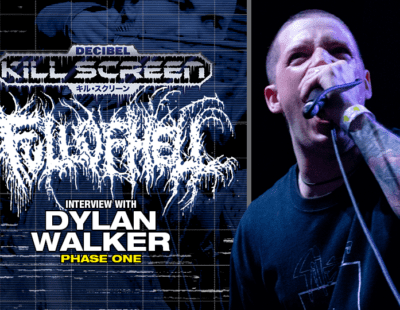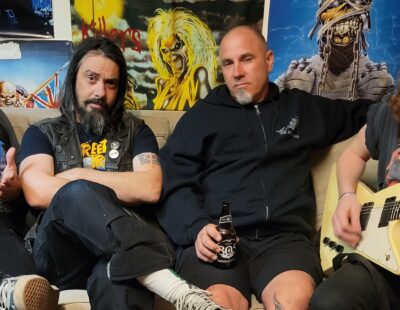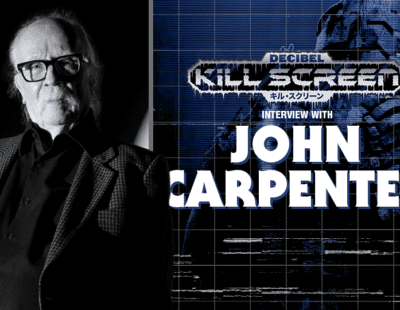
In the world of heavy and extreme music, there’s a tension at play between the raw and the developed. It’s a constant push and pull between a stripped-down and basic approach, and one that reaches for more ornate and theatrical heights.
For black metal more specifically, the latter category is what propelled a few bands to near-crossover status in the late 1990s, after the turbulent years of the black circle had passed into memory. These bands blended the cold, fast and aggressive template with orchestral sounds, operatic background vocals and a larger-than-life image that transcended the second wave’s more narrow aesthetic.
This led to cries of “False!” from much of the underground, but the more polished and grandiose form of black metal lent itself to a wider audience. This was especially true of Dimmu Borgir and Cradle of Filth, but Gehenna, Limbonic Art and mid-era Emperor (Anthems and Equilibrium) merit consideration as well. At times, the theatrical side could be taken too far and come off a little silly. But at its best, the music was entrancing and unforgettable.
While this symphonic and theatrical form of black metal is no longer the new, trendy thing, it still has its modern devotees. Again, many of these come across as try-hard LARPers who missed their calling at drama school. However, there are some bands that get the balance just right and back up their image with great music. Perhaps the best example is Britian’s Necronautical.
When I saw them play last year in the UK, I had no idea who they were. But halfway through the first song, I knew this band had something special going on. The band was entertaining and had a rock-star swagger to them, but they were also poised, tight and focused as well. And the music took everything that made records like Enthrone Darkness Triumphant and Dusk and Her Embrace such classics, and brought a haunting energy to the stage that made it feel fresh, vital and exciting (there’s hints of Bergtatt and The Nocturnal Silence creeping in the background as well). They were fun! (Hey everyone, remember what that feels like!?!?!) But you still take them seriously!
The band recently signed to Candlelight Records, which will be releasing Apotheosis on August 30, and features the artwork of David Thiérrée on the cover. You can check out “Nihil Sub Sole Novum” below. In the meantime, I also got to chat with Anchorite (bass), Naut (guitars, vocals) and Carcarrion (Guitars) about the band and what inspires them to create such a towering racket.
Tell us a bit about the band. How did you come together and forge your sound?
Carcarrion: The band was initially started as a recording project between myself, Naut and Anchorite. We’ve all been friends for many years and so the band’s synergy was already in place. We all come from similar backgrounds musically, and so songwriting was a very natural process for us and our sound developed very organically. We quickly realized after our first self-released album that we were into something worth committing to. Since then, we’ve brought Slugh into our ranks on drums, who has contributed his own playing style to our sound and vision.
Naut: I think what’s always worked for us in terms of songwriting is not to overthink it. I believe that going with what feels natural to you always yields the best results, rather than trying to conform to one particular style or approach. This band has always been very focused on the creative process. I find writing music very cathartic, from inception to completion, for me it serves as escapism from the trials in life. Because of this, the music can become quite personal, but the joy of working with friends who understand each other is that we can all hone in on the vibe of a piece and add our own ideas to the mix, without subtracting from that original emotion. We’re all very much on the same page in terms of what we want to do creatively. Because of that we’re able to create from a personal perspective, as well as a collective. I think over the years we’ve all become very attached to that process, and our output has matured with us.
What themes do you like to explore in your music and lyrics?
Anchorite: The key theme that has been present through all our music has been that of exploration. Initially, on demos and our self-released album Black Sea Misanthropy, we focused on notions of death and the underworld, hence the name of the band. More recently, we have expanded on the exploratory concept by treating our songs themselves as essays into the unknown, focusing on the borders between the esoteric and the plain, the rational and the irrational, the cosmos and the self. We like to combine the grandiose language and assumed awe of religion and mythology with narratives centered around a king of humanist science fantasy, to create a sensation of subversive self-empowerment.
On a similar point, what are the primary themes of the new album?
Anchorite: Apotheosis is a loose concept album based around the single idea that man creates god rather than the other way around, and the songs discuss the different effects of this on the notions of hope, power, belief and reality. One of the main questions the album asks is: “What kind of god would man create now?” The image of the fire and brimstone authoritarian of many religions is increasingly irrelevant in a modern world, and our new single “Nihil Sub Sole Novum” describes how apathy, among other ‘negative’ ideas, has become a force powerful enough to manifest mankind’s new deity. The album is a deeply spiritual work, far more than just a critique of organized religion. Instead, we acknowledge the impact that belief has on life and explore its intricacies through a bleak narrative about the emergence of a new god, paying homage to the ideas of our favorite authors and thinkers, such as Friedrich Nietzsche or Chuck Palahniuk.
Naut: A key point in our creative process is ensuring that the music, lyrics and artwork all serve one another. Once we’ve accumulated a few musical ideas, an overall feeling seems to emerge from the music. I believe that is a manifestation where we are in our lives, what we’re going through emotionally. As we’re growing older, we begin to realize that time is short, and there are some things that we’ll just never do. And so our priorities change, our view of our place in the world. We start to ask ourselves what we really want from our lives, and more importantly, does that ultimately matter? In scientific terms, against the infinite scale of time and the universe, our lives as individuals count for nothing. During the time of writing this album, I was really thinking about this a lot. Human beings are intrinsically egoistic creatures, with a need to feel significant, but the reality is that they’re not. Religion fulfills this need in many people, and serves as a comfort. But in the broadest terms, our pursuits are little more than vanity. Together we started to discuss the notion of emptiness becoming a new deity for the scientific age, a kind of existential nihilism that is as depressive as it is liberating. “Apotheosis” means “the elevation of something to divine status,” but in this way of thinking, it is the elevation of nothing. In a more personal sense, it’s an album about coming to terms with mortality.
Seeing you guys play live was quite a rousing experience! What motivated you to take an epic and theatrical approach to your music and performances?
Carcarrion: We’ve always believed that one of the greatest aspects of this kind of music is it’s power to create atmosphere, both visually and sonically, in a way that can be utterly consuming, and almost spiritual. It’s not dissimilar to the grandiose approach taken by places of religious worship to inspire feelings of the divine. This is what we aim to achieve, but as an inversion of the religious process. Rather than asking people to cower before a greater power we seek to invoke feelings of personal power and liberation from the mundane. This feeling goes for us performing the music and for those watching. Atmosphere is all. Whether we achieve this at any given show is of course down to the individual, however this is always what we seek to achieve and why we do what we do.
Naut: I think it serves the nature of our music, the sounds and ideas are vary overboard and grandiose, and we want to feel a part of that. It’s important to us to be able to create a situation where we can step out of ourselves and immerse ourselves in the feeling of our music. For me, it helps me to feel more focused, and more connected to what I’m doing. It’s not like an out-of-body experience, we are still ourselves, but I’d say its a way of amplifying that part of ourselves that we’re engaged with throughout the creative process. To change my appearance and environment has a powerful effect on my connection to the performance. We’re big believers in the idea that to create something people are able to connect with, the artist ought to feel fully connected to what they’re doing in the first place. Of course I’m not suggesting that performing in this way is necessary to achieve that, but for us it helps us achieve greater inertia, and our hope is that those in the audience will also be receptive to that.
Finally, with the new album on its way, what plans do you have for the rest of the year in terms of shows?
Naut: We have played extensively around the UK this year whilst we focused on releasing the new album. Still to come we have a short tour of the north with our friends in The Infernal Sea and Burial, where we’ll be debuting the title track from the new album. We’ll also be playing in our home town of Manchester as support to Sojourner and Havukruunu, shortly after the release of our album. We have begun booking beyond this as well, and whilst I cannot make the announcements yet, we have some really exciting stuff in the pipeline, including some further international performances and some apparitions in some really special, atmospheric venues. We feel really lucky to be able to do what we’re doing, and we’re excited to see where Apotheosis will take us.







